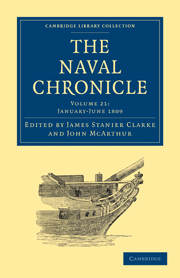 The Naval Chronicle
The Naval Chronicle Book contents
- Frontmatter
- PLATES IN VOLUME XXI: From Original Designs
- PREFACE TO THE TWENTY-FIRST VOLUME
- MEMOIR OF THE PUBLIC SERVICES OF CAPTAIN HUGH DOWNMAN, OF THE ROYAL NAVY
- MEMOIR OF THE PUBLIC SERVICES OF CAPTAIN MICHAEL SEYMOUR, OF THE ROYAL NAVY
- MEMOIR OF THE PUBLIC SERVICES OF THE LATE SIR HUGH CLOBERRY CHRISTIAN, K.B. REAR-ADMIRAL OF THE WHITE SQUADRON
- MEMOIR OF THE PUBLIC SERVICES OF ADMIRAL SIR C. M. POLE, BART. M.P.
- MEMOIR OF THE PUBLIC SERVICES OF THE RIGHT HON. ALAN HYDE LORD GARDNER. REAR-ADMIRAL OF THE BLUE SQUADRON
- MEMOIR OF THE PUBLIC SERVICES OF THE LATE PHILIP AFFLECK, ESQ. ADMIRAL OF THE BLUE SQUADRON; AND OF THE LATE SIR EDMUND AFFLECK, BART. REAR-ADMIRAL OF THE RED SQUADRON
- INDEX
MEMOIR OF THE PUBLIC SERVICES OF CAPTAIN MICHAEL SEYMOUR, OF THE ROYAL NAVY
Published online by Cambridge University Press: 10 January 2011
- Frontmatter
- PLATES IN VOLUME XXI: From Original Designs
- PREFACE TO THE TWENTY-FIRST VOLUME
- MEMOIR OF THE PUBLIC SERVICES OF CAPTAIN HUGH DOWNMAN, OF THE ROYAL NAVY
- MEMOIR OF THE PUBLIC SERVICES OF CAPTAIN MICHAEL SEYMOUR, OF THE ROYAL NAVY
- MEMOIR OF THE PUBLIC SERVICES OF THE LATE SIR HUGH CLOBERRY CHRISTIAN, K.B. REAR-ADMIRAL OF THE WHITE SQUADRON
- MEMOIR OF THE PUBLIC SERVICES OF ADMIRAL SIR C. M. POLE, BART. M.P.
- MEMOIR OF THE PUBLIC SERVICES OF THE RIGHT HON. ALAN HYDE LORD GARDNER. REAR-ADMIRAL OF THE BLUE SQUADRON
- MEMOIR OF THE PUBLIC SERVICES OF THE LATE PHILIP AFFLECK, ESQ. ADMIRAL OF THE BLUE SQUADRON; AND OF THE LATE SIR EDMUND AFFLECK, BART. REAR-ADMIRAL OF THE RED SQUADRON
- INDEX
Summary
“Vile latens virtus: quid enim submersa tenebris
Proderit obscuro?”
Claud. iv. Cons. Hon.Virtue conceal'd is but of little worth:
For what of good, in dark obscurity,
Can it produce?
AT a time when the undaunted firmness and bravery of a nation become essential securities against the insults, barbarities, and tyranny of a power that seeks for universal dominion, to record the particular acts of prowess performed by our gallant countrymen, is a duty so fit, just, and necessary, that no question can arise as to its propriety, whether it be considered as a grateful acknowledgment to bravery, or as holding out an example of emulation. To this mark of distinction Captain Michael Seymour, the gallant captor of the Thetis, is highly entitled; and it is with particular pleasure that we seize on the opportunity afforded us of presenting the public with a short, but we believe, accurate sketch of that officer's services.
For his birth, Captain Seymour is indebted to the sister island, now happily forming a component part of the British empire. He was born on the 8th of November, 1768, at the Glebe House, at Palace, in the county of Limerick; and if the descent from virtuous and honourable parents be gratifying, he is in that respect indeed eminently fortunate. At the time of his birth, the Rev. John Seymour was rector of Palace—a man of exemplary piety, of a most amiable and benevolent disposition, and endowed with considerable learning.
- Type
- Chapter
- Information
- The Naval ChronicleContaining a General and Biographical History of the Royal Navy of the United Kingdom with a Variety of Original Papers on Nautical Subjects, pp. 89 - 176Publisher: Cambridge University PressPrint publication year: 2010First published in: 1809


